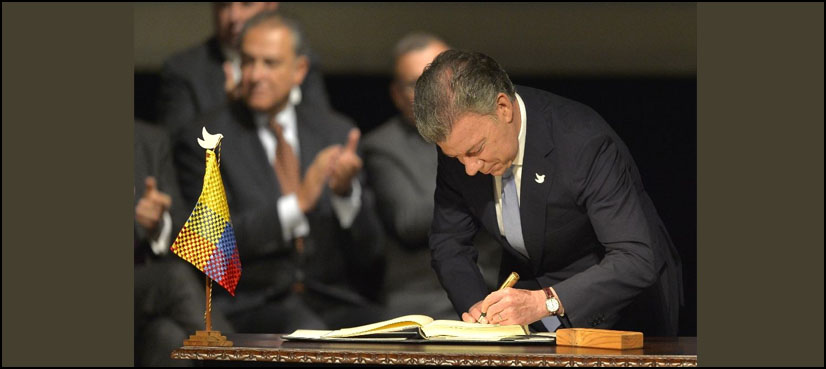BOGOTA: Colombia’s government and FARC rebels signed a controversial revised peace accord Thursday to end their half-century conflict, set to be ratified in Congress despite bitter criticism from opponents.
President Juan Manuel Santos and guerrilla leader Rodrigo “Timochenko” Londono signed the new deal with a pen made from a bullet used in the conflict, in a low-key ceremony in the capital Bogota.
The original deal — signed with great fanfare in September — was rejected by voters in a referendum last month, a shock upset that sent negotiators back to the drawing board.
The new plan bypasses a vote by the Colombian people — against bitter opposition from critics.
They say the revisions are only cosmetic and will still grant impunity for war crimes committed by the Revolutionary Armed Forces of Colombia (FARC).
Santos, who won this year’s Nobel Peace Prize for his efforts to end the conflict, defended the new deal.
“We all know in our souls that the cost of the armed conflict is too high,” he said after the signature. “All, absolutely all of us, know that peace will return our hope, our faith in the future.”
MUST READ: Colombian President Santos wins Nobel Peace Prize
Londono hailed a deal that will enable Colombians “to definitively end the war and confront our differences in a civilized manner.”
The deal will immediately be sent to Congress, where it is expected to pass after being debated next week. Santos and his allies hold a majority in the legislature.
The government and FARC both say they are under pressure for fear that their fragile ceasefire could break down. A recent wave of alleged assassinations in conflict areas has raised pressure to seal a deal fast.
The aftermath of discord and uncertainty appears likely as opponents promised to keep resisting the peace plan.
The Democratic Center Party, led by conservative ex-president Alvaro Uribe, called plans to push the new deal through Congress a “blow to democracy.”
Opposition objections
Thursday’s ceremony was held at the Colon Theater in Bogota — relatively small, with a capacity of just 800.
Some 2,500 guests including 15 heads of state attended the signing of the initial deal, held with exuberant festivities in the Caribbean city of Cartagena.
Government and FARC negotiators presented a redrafted version of the deal earlier this month.
But Uribe complained it still did not satisfy his key demands, notably on punishing FARC leaders for the many thousands of killings and kidnappings blamed on the group.
Under the deal, the Marxist rebels would disarm and become a political party. The current deal allows non-custodial “alternative” sentences for convicted FARC members.
Uribe and his allies demand tougher punishments and say rebel leaders guilty of war crimes should not be allowed to run for office before completing their sentences.
They also want guarantees for state police and soldiers who may face trial over their own actions in the conflict.
A survey published on Wednesday found that 58 percent of people want more revisions to the deal, in line with opposition demands.
Bypassing voters
Congress will open a live televised debate on the deal from next Tuesday. Uribe’s party has demanded a second popular vote on the accord, accusing Santos of using Congress to impose the agreement on the people.
On the streets of Bogota, Angie Suarez, 21, a sales assistant, said it was not fair to push the deal through Congress.
“They go over our heads, as if our opinion meant nothing,” she said. A street vendor Manuel Duran, 40, thought it was “better for Congress to do it” because another referendum would “divide the country.”
A two-way ceasefire between the government and FARC has been in force since August, but both sides have warned it is fragile.



Leave a Comment